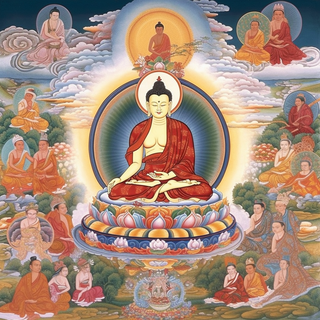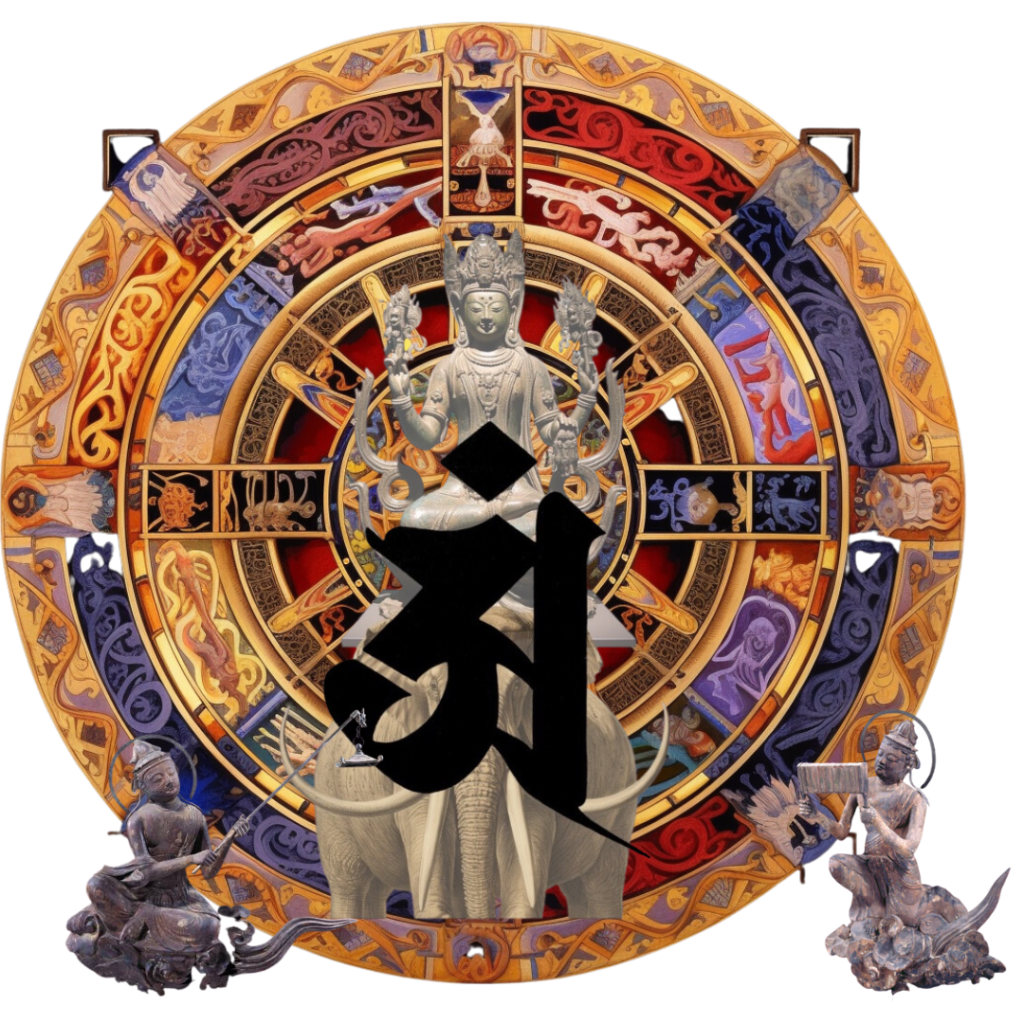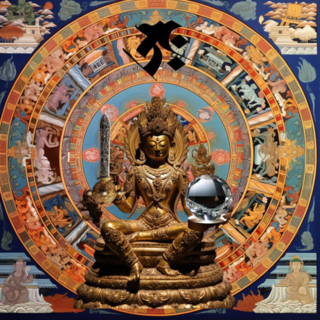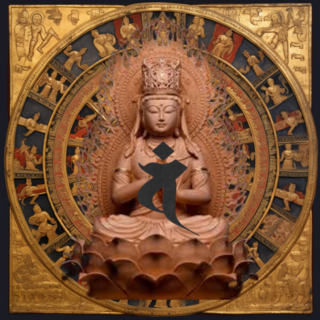
マハーナーマよ、このように優婆塞の十六法を成就する者は、世間に得難い存在なのです」
マハーナーマはこの仏さまの説法を拝聴して大いに喜び、また仏の教法を讃歎したのちに座を 立って礼を行い、その場を去りました。
お釈迦さまのお答えを聞いた後で、 マハーナーマは「世尊よ、 優婆塞は幾の法を成就し自ら安 他を安んずるや」と質問をしました。
ここに、安んじという言葉が出てまいりますが、これは、単に心が安らかになる、ということ ではなく、成仏するという意味です。なぜならば、すべての因縁を解脱しなければ、完全に安ら かになることはできないからです。 因縁を切って初めて、本当の安心が得られるわけです。
たとえば、瞑想や坐禅によって安心が得られるという方がおりますが、瞑想や坐禅をやってい る時は迷いが消えても、因縁がそのままになっているならば、瞑想の定が解けた時にまた苦しみ が襲ってきます。ですから、真に安らかな状態というのは、すべての因縁を解脱し、成仏した状 態なのです。
そのように考えていきますと、「優婆塞は幾の法を成就し自ら安じ他を安んずるや」とは、 「優婆塞はいくつの法を成就すれば、自分を成仏させ、他の者を成仏させることができるのでし ょうか?」
という意味になります。
その質問に対して仏さまは、「若し優婆塞十六法を成就する者は、是れ優婆塞自ら安んじ他を
「安んずと名づく」とお答えになられました。 これは、
「優婆塞は十六法を成就すると、 自分を成仏させ、他人を成仏させることができるのだ」
という意味です。
それでは十六法とはどういうものか、箇条書きにしてみましょう。
1自ら正信を持つ
2他の者にも正信を持たせる
3自ら浄戒を保つ
4他の者にも浄戒を保たせる
5自ら布施の行をする
6他の者に布施の行を教える
7自ら塔寺に参詣し、もろもろの沙門から教えを聞く
他の者に塔寺に参詣してもろもろの沙門から教えを聞くことを教える
沙門から聞いた教法を自ら受持する
他の者に、沙門から聞いた教法を受持するように教える
自ら教法の深義を観察する
他の者に教法の深義を観察することを教える
自ら法に近づく
他の者に、法に近づくことを教える 自ら法を追及する
他の者に法を追及することを教えるとなります。
要するに、八法を自らが実践すると共に、他の者にも八法を勧めることが十六法であり、この 十六法を実践することによって、自分も他人も成仏させることができる、と説かれているわけで す。そして、それが優婆塞の本道だというわけです。
したがって、「一切事経』のこの部分は、
「阿含経は自分だけの悟りを考える小乗経典ではない」
ということを証明しています。
正信を広める
もし、お釈迦さまが優婆塞の八法だけを説いていたならば、やはり「阿含経」は小乗経典とい わざるを得ません。 なぜならば、八法とは自分だけの修行だからです。 八法で他人のことを考え ているのは施ぐらいのもので、他は自分の悟りのことだけを考えています。
その施にしても、自分が布施をして自分が徳を得るのですから、他の人に布施を勧め、その人 が徳を得るようにしてあげるのと比較すれば、やはり、利他の行というよりは自利の行に近くな
だからこそ、お釈迦さまは八法だけではなく十六法を説かれました。他を利益し、成仏に向か わせることを強調されたのです。このことから、お釈迦さまの教法もそれをまとめた「阿含経」 も小乗ではなく、むしろ自らを大乗といっている人たち以上に大乗である、とわたくしは考えて
わたくしは、「阿含経」の中で、お釈迦さまがこの十六法をお説きになっていらっしゃるから こそ、阿含宗立宗を決意しました。 もしも八法しか説かれていなければ、阿含宗という教団は 立宗できません。自分だけ悟ればいい、自分だけ成仏すればいい、という仏教を立ててもしかた がないからです。
ところが、お釈迦さまは自他共に成仏させる十六法を説いていらっしゃいます。だからこそ、 わたくしは困難な道ではありますが、阿含宗立宗に踏み切りました。 これは、大切なことですか ら、しっかりと覚えておいていただきたい。
お釈迦さまは十六法において、
「摩訶男よ、若し優婆塞、 正信を具足し、他人を建立し」
とおっしゃっておりますが、 この中の「正信」は非常に大切な意味を持っております。 この、 「正信を具足して」というのは、ただ単に仏教に対する信仰を持て、 ということではありません。 正しい信でなければいけないよ、と念を押されておられるわけです。さり気ない言葉ですが、そ の意味するところはとても深いといえます。
Commentary
Mahanama, a person who fulfills the 16 laws of Yubasai in this way is a rare existence in the world."
The Mahanama was greatly pleased when he heard the Buddha's sermon, and after praising the Buddha's teachings, he rose from his seat, bowed, and left the place.
After listening to the Buddha's answer, the Mahanama asked, "World Honored One, has Yuva Sai attained several Dharma and made peace with himself?"
The word annji is used here, but it does not simply mean that one's heart becomes at peace, but it means that one attains Buddhahood. This is because you cannot attain complete peace unless you are liberated from all karma. It is only when you cut off the ties that lead to true peace of mind.
For example, there are people who say that meditation and zazen give them peace of mind. Suffering comes. Therefore, a truly peaceful state is a state of liberation from all karma and enlightenment.
If you think about it in this way, ``How many Dharma are fulfilled by Yubasa, and how many dharmas will you be able to calm down yourself and others?'' , is he capable of making others attain Buddhahood?"
It means that ・ ・ ・
In response to this question, the Buddha replied, ``If you are able to fulfill the 16 Laws of Yubasai, then you should rest in peace with yourself.
He answered, "I will name you Anzu." this is,
"When Yubasai fulfills the Sixteen Dharma, he can bring himself to Buddhahood and bring others to Buddhahood."
is what it means.
So, let's itemize what the Sixteen Laws are.
1 have one's own truthfulness
2 Make Others Honest
3 Keep oneself clean
4Let Others Keep Pure Precepts
5Personally donate
6 Teach others the practice of giving
7 Pilgrimage to pagodas and hear teachings from various sammons
Teach others to visit the pagodas and hear the teachings from the various Shamons.
Accepting the Dharma learned from the Shamon
Teach others to uphold the Dharma heard from the Shamon
Observing the deep meaning of the Dharma for oneself
Teach others to observe the depth of the Dharma
approach the law
Teach others to approach the law Pursue the law yourself
It teaches others to follow the law.
In short, the 16 Laws are to practice the 8 Laws oneself and to recommend them to others. He is And that is the main path of Yubasa.
Therefore, this part of the Issai Jing is
"The Agon Sutra is not a Hinayana Sutra that considers one's own enlightenment."
That's what I'm proving.
spread the truth
If Shakyamuni Buddha only preached the Eight Laws of Yubasai, he would have to say that the Agon Sutra is the Hinayana Sutra. This is because the Eight Laws are your own practice. In the Eight Dharma, he thinks about others, and he only cares about charity, and the others only think about his own enlightenment.
As for charity, since one gains virtue by giving charity, if one compares it with recommending charity to others and helping them gain virtue, it is still called the act of altruism. It's closer to the line of self-interest than
That is why the Buddha preached not only the Eight Dharma, but also the Sixteen Dharma. Emphasis was placed on benefiting others and leading them toward enlightenment. From this, I believe that neither the Buddha's teachings nor the Agon Sutra, which summarizes them, are Hinayana, but rather, they are more Mahayana than those who call themselves Mahayana.
I decided to establish the Agon sect because the Buddha preached these 16 laws in the Agon Sutra. If only the Eight Dharma were preached, the sect of Agon sect would not be able to establish itself. This is because there is no point in establishing Buddhism that only one person should be enlightened and only one person should attain Buddhahood.
However, Shakyamuni Buddha has preached the 16 ways to help oneself and others attain Buddhahood. That is why, although it was a difficult path, I decided to follow the Agon sect. Is this important?
In the sixteen laws, the Buddha
"Makao, if you're a good man, build Masanobu and build someone else."
As you say, "Masanobu" in this has a very important meaning. This ``with full faith'' does not simply mean having faith in Buddhism. It must be the correct faith. It's a casual word, but it has a very deep meaning.
【このカテゴリーの最新記事】
-
no image
-
no image







